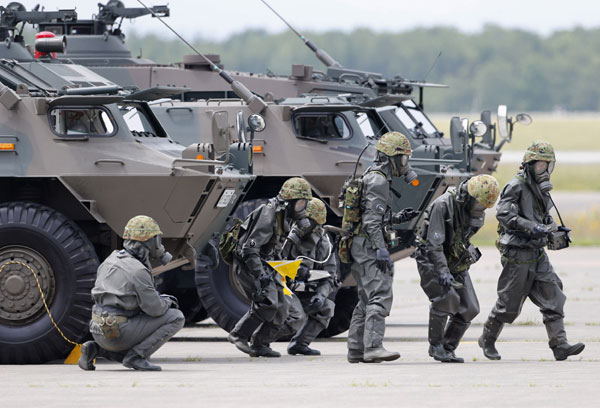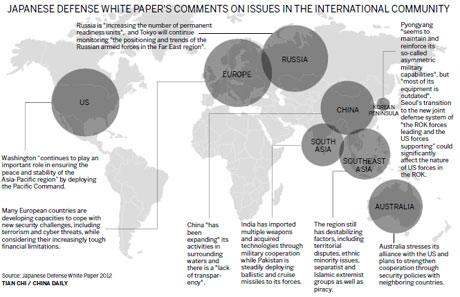
Tokyo on Tuesday released its annual defense white paper, prompting analysts to warn there are fears Japan is overemphasizing China's maritime military presence in the region.
Japanese Defense Minister Satoshi Morimoto delivered a speech on the The Defense of Japan 2012 report to his cabinet during a morning meeting in Tokyo. China's naval operations were highlighted both in the white paper and Morimoto's comments.
The report said China "plans to expand the sphere of its maritime activities" and carry out its operations "as an ordinary routine practice" in waters surrounding Japan, including the East China Sea, the Pacific Ocean and the South China Sea.
"(We) especially want to explain to our people as impartially as possible, China's moves in the ocean," Morimoto told reporters.
The Defense Ministry's report sent warning signals over Beijing's "continuous enhancement in maritime patrol", and calls for attention to the operations of Chinese naval vessels and "various surveillance operations near Japan".
 |
|
Personnel from Japan's Self-Defense Forces take part in a nuclear, biological and chemical weapons exercise on July 4. The exercise was held as a part of a drill for the Proliferation Security Initiative Air Interdiction Exercise "Pacific Shield 12", at New Chitose Airport in Chitose on Japan's northern island of Hokkaido. Issei Kato / Reuters |
Major patrols and passings by Chinese fishery administration vessels and warships near the waters of China's territorial Diaoyu Islands in recent years were listed in the report, and it accused China of "intruding" on Japan's "territorial waters".
Ye Hailin, a professor in international relations at the Chinese Academy of Social Sciences, said Japan has shown its obvious "unbalanced mindset" when it accused China's ordinary progress in defense enhancement a so-called threat from its neighboring country.
"Chinese naval vessels have been passing through international watercourses into the Pacific Ocean, which is completely legal and justified," Ye said, adding that Tokyo should focus its own problems first.
Japanese Prime Minister Yoshihiko Noda in early July said that his cabinet is seeking to "nationalize" part of the Diaoyu Islands, a move that has added tension to the islands' situation.
Beijing has lodged solemn representations to Tokyo and said "nobody is ever allowed to trade in China's sacred territory". Three Chinese administration vessels were confronted by a Japanese Coast Guard patrol ship in waters near the Diaoyu Islands on July 11 during their regular mission.
Japan's domestic media have slammed Noda's cabinet for its poor performance, and Noda's ruling Democratic Party of Japan is also facing poll pressure.
The white paper speculated on the intentions of China's activities in "waters near Japan", and phrases including "protecting maritime rights and interests" and "energy resources" are common throughout the report's section on China.

China is not breaching the navigation freedom in the waters mentioned in the report, and China's need to develop energy resources for the domestic economy is justified, said Huo Jiangang, an expert on Japanese studies at the China Institute of Contemporary International Relations.
Huo warned that Tokyo is "taking its imagination as a fact", and it is sending misleading messages to not only the domestic public but also other countries.
Tokyo is speeding up its pace to normalize its armed forces by revising relevant laws and bills, and experts warned that the white paper serves as a tool to drum up support from domestic nationalists.
Currently Japan is far from optimistic in terms of its domestic economy and financial stability, said Liu Jiangyong, an expert on Japanese studies and vice-dean of the Institute of Modern International Relations at Tsinghua University.
Japan has put China on its watch list to defend against in its National Defense Program Outline released in 2010, and playing up China's threat can "provide an excuse for increasing its defense budget", said Liu.
Noda and Morimoto last week said on separate occasions that Japan could deploy its Self-Defense Force troops if maritime confrontations escalate beyond what could be handled by its Coast Guard, although Japanese Cabinet Secretary Osamu Fujimura later downplayed Morimoto's remark.
"The anxiety of being an island country is just part of the problem, what is more important is that Tokyo is keen to normalize its military and continue modernizing its armed forces by throwing mud at other countries," Ye said.
zhangyunbi@chinadaily.com.cn